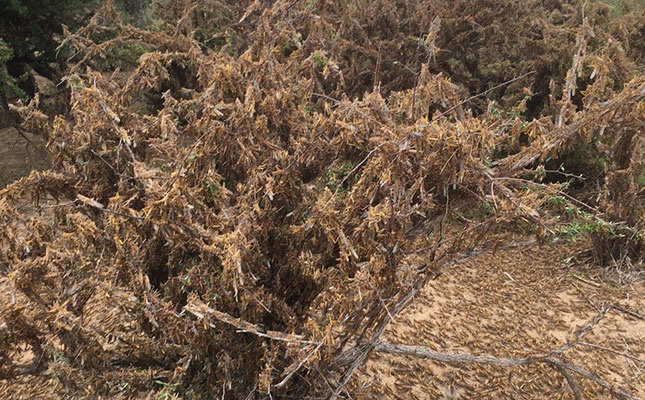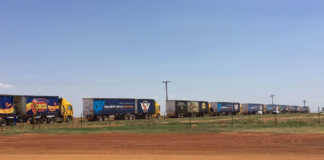
Photo: FW Archive
While difficult to quantify, it could be safely assumed that thousands of hectares of grazing have thus far been destroyed by brown locusts (Locustana pardalina) in the Eastern Cape since the start of the 2021/22 summer season.
This was according to Peter Cloete, Agri Eastern Cape president. He told Farmer’s Weekly that a rough estimate indicated that the locusts had destroyed about 50% of the grazing that had regrown after the first good rainfall received in the province following the devastating multiple-year drought across large parts of the Karoo.
“The swarms have [also now] transitioned from the hopper stage to the flyer stage, which makes it even more difficult to detect and manage the insects,” he said.
Currently, the bulk of the swarms occurred in the vicinity of Middelburg and Steynsburg and surrounding districts.
In most of the areas affected, teams have been set up to spray the locusts in an attempt to contain the latest outbreak.
According to Cloete, these teams were working from dusk to dawn to control the swarms, as well as prevent the locusts from heading further east and causing more destruction.
“I can’t even imagine what would happen should the swarms reach areas such as Cradock where lucerne and maize are produced. It would have a terrible impact on food security in our province, to name but one consequence,” he added.
Cloete expressed gratitude towards the authorities for the support in the fight against the locusts, and said several million rand had been spent to combat the locusts so far. However, the extent of the outbreak was so vast that it was not possible to totally eradicate the insects.
“Many people see farming as the ideal career option without having a clue about all the external factors farmers have to deal with. Although our local farmers are considered among the best risk managers in the world, events such as this colossal outbreak fall way [outside the] normal risk management [scope], and is bound to have a long-term impact on the agricultural industry,” he said.
Meanwhile, irrigation crop producers near the border between the Free State and the Northern Cape were ready for possible outbreaks of flyers after the detection of huge swarms in the nearby Colesberg district in the Northern Cape.
According to Dr Jack Armour, Free State Agriculture’s (FSA) operational manager, a minor outbreak had been reported in the Phillipolis district, but no major outbreaks had occurred in the province yet. He said it would be a terrible disaster if the locusts managed to reach the irrigated crop areas.
“We are nonetheless preparing ourselves for all eventualities. We still need protective clothing and spraying equipment from the state, as well as the appointment of more district locust officials. However, from FSA’s side we are doing all that is possible to combat and manage any possible outbreaks effectively,” he added.
Both Cloete and Armour urged anyone who came across a swarm to report it to the national and provincial agriculture departments, Agri Eastern Cape, or FSA.











